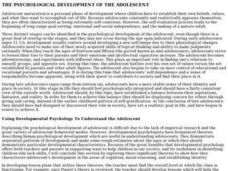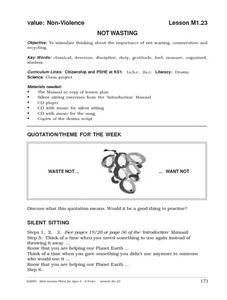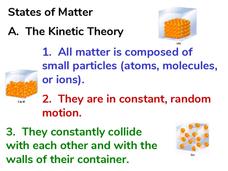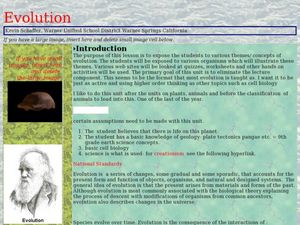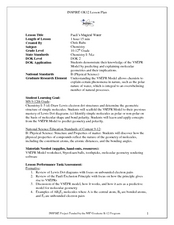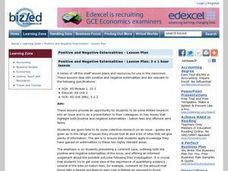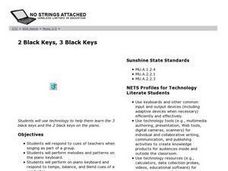Curated OER
The Physiological and Psychological Development of the Adolescent
Students examine the life of a teenager from their own perspective and an adult's. In groups, they focus on the biological changes and how they are different in a girl and a boy. Individually, they write a paper about these changes and...
Curated OER
Glacial Striation Investigation
Students operate a GPS unit to investigate the direction of glacier movement. They describe the motion of glacier movement by interpreting a graph. Students explain how scientists use glacier striations to determine glacier movement.
Curated OER
NOT WASTING
Students brainstorm and analyze creative ways to not waste materials and recycle more as an individual. The theory and importance of conservation is also stressed within this lesson. In addition, silent sitting is exercised, story...
Curated OER
The Element of Color
Eighth graders study and analyze the elements of color by creating an personalized color wheel. Emphasis is placed on constructive criticism of student work by others for assessment. Students create short poems for their color wheel...
Curated OER
WHAT MAKES A LIGHT BULB LIGHT?
Middle schoolers are able to use inquiry to answer the essential questions. They are able to predict and test configurations of a battery, bulb, and wire that make the complete circuit. Students craft a group and individual theory of a...
Curated OER
States of Matter
This particle PowerPoint includes many pictures to illustrate solids, liquids and gasses and the behavior of their particles.
Curated OER
Why Don't Whales Have Legs?
High schoolers are given a variety of materials and are asked to design a heat loss experiment that results in a reasonable explanation of "Why don't whales have legs?" students work with the theory of natural selection.
Curated OER
Evolution
Tenth graders are introduced to the topic of evolution. Using the internet, they discuss Charles Darwin's life and work in this field of science. They examine fossils and discuss how they support the theory of evolution. They participate...
Curated OER
Evolution Explorations
Middle schoolers compare characteristics of animals and human beings. In this biology lesson, students observe an animal and record their observations. They infer whether the evolution theory is true or not.
Curated OER
Hide and Survive: A Natural Selection Activity
Students explore the theory of natural selection given certain scenarios. In this biology lesson, students graph data taken from the experiment. They explain the factors that contribute to the survival of the fittest.
Curated OER
Pauli's Magical Water
Pupils predict the shape of molecules using VSEPR theory. In this chemistry lesson, students differentiate a polar and nonpolar molecule. They discuss why water's polarity is very important.
Curated OER
Simple Machines: Levers
Students discover the fundamentals and daily applications of simple machines. They investigate basic engineering theory through their hands-on demonstrations of levers.
Curated OER
POSITIVE AND NEGATIVE EXTERNALITIES
Students work as a group to research a current issue, articulate the key points relating to the issue and to have data to support those key points, and use appropriate economic theories to help explain the issues arising.
Curated OER
Modeling Earthquake Data
Students evalute evolutionary theories and processe of Geology. They examine evidence that the movement of continents has had signicicant global impact, major geological events. Students evaluate the forces which shape the lithosphere...
Curated OER
Sequential Curriculum for Advanced Writing Workshop
Twelfth graders engage in a ten-month long elective course focusing on college board review and an advanced writing workshop. Both course components focus on thinking and reasoning skills. Various approaches include sentence combining,...
Curated OER
Let's Heat Things Up!
Students build and evaluate simple models to understand the greenhouse effect. They explore the role of increased greenhouse gas concentration in global warming, and the implications of global warming theory for engineers, themselves...
Curated OER
2 Black Keys, 3 Black Keys
Learners explore the black keys on the piano and basic music theory techniques using the Internet as a guide. Websites visited include www.PianoNanny.com and musictheory.net.
Curated OER
Committing Crime or Just Having Fun?
Students breakdown different types of youth crime/gangs. Students evaluate the power of peer pressure. Students identify and offer advice for dealing with peer pressure. Students encounter the theory of phenomena.
Curated OER
Earth is Round?
Third graders discuss how Aristotle concluded that the Earth was round. As a class, they review theories about the Earth's shape and describe how life on Earth would be different if it were flat. Individually, they make a moon book in...
Curated OER
In Search of a Land Ethic
Students research the theory that everything is connected to everything else. Students explore the concept of how do we put normative values on our nonhuman environment. Students investigate an ecologist and write an informational...
Curated OER
How Does Chance Influence Inheritance?
Learners complete a lab based on how chance affects which genes appear in gametes as in Mendel's Law of Segregation. They review the theories, vocabulary words, and historical background of Gregor Mendel's work with pea plants. They...
Curated OER
Pythagoreum Theorem
Students practice assessing how to apply the formulas for the area of parallelograms and triangles. They recount the contributions of Pythagoras and apply the theories of the Pythagorean theorem in a group project to calculate the...
Curated OER
Einstein's Big Idea
Students investigate the concept of the Einstein's Theory of Relativity while conducting research using the internet and following the outline of the objectives to guide the information search. The lesson includes background information...
Curated OER
Rainbow Spinner
In this rainbow spinner activity, students participate in making a rainbow spinner in order to investigate the splitting and mixing of light. Students study the theory of persistence of vision.
Other popular searches
- Number Theory
- Music Theory
- Atomic Theory
- Cell Theory
- Big Bang Theory
- Color Theory
- Economic Theory
- Music Theory Lesson Plans
- Theory of Evolution
- Germ Theory
- Continental Drift Theory
- Cell Theory Scientists


